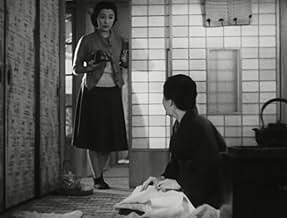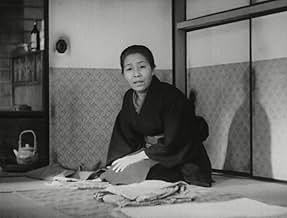VALUTAZIONE IMDb
7,2/10
1534
LA TUA VALUTAZIONE
Una vedova scopre che il defunto marito l'ha lasciata in debito con figli ingrati, tranne un figlio premuroso tornato dalla Cina per sostenerla.Una vedova scopre che il defunto marito l'ha lasciata in debito con figli ingrati, tranne un figlio premuroso tornato dalla Cina per sostenerla.Una vedova scopre che il defunto marito l'ha lasciata in debito con figli ingrati, tranne un figlio premuroso tornato dalla Cina per sostenerla.
- Premi
- 1 vittoria in totale
Recensioni in evidenza
Ozu enters William Wyler terrain with a somber upscale family drama about a mother and daughter who are shuttled in unwelcome fashion from one family member's home to another following the death of the family patriarch. The thematic elements of displacement within a family unit anticipate TOKYO STORY -- there's even a bedtime scene between the mother and daughter that echoes one in the later film. There's a startling lack of music in this film, esp. during Ozu's normally music-filled transitional shots, that contribute to an overall sense of tense unease that touches on what might have been the general wartime state of mind among Japanese at that time. The war makes a subtle appearance in the form of the youngest son who offers to take the unwanted family members with him to settle in China -- a moment which might be aligned with Imperialist propaganda, though in a fascinating way: the Chinese "frontier" seems presented as a place where Japanese society can escape its social hypocrisies and begin anew.
...and director Yasujiro Ozu. When the patriarch of a wealthy and respected family dies suddenly, his children are shocked to learn that he was secretly deeply in debt. They are forced to sell off his property and belongings to pay off this debt, which unfortunately leaves their mother (Ayako Katsuragi) and youngest, unmarried sister Setsuko (Mieko Takamine) without a place to live. The various brothers and sisters take them in, but personality clashes and selfish behavior finds the two women shuffled from one place to the next.
Ozu's strict, regimented filming technique is in full effect here, with cameras set low and at a distance, rarely moving within a scene, and very little music used to score. The performances are all low key, and much of the dialogue is seemingly banal banter. But there is a lot of roiling emotion suppressed in these characters, and it boils up on occasion to moving effect, although never in a loud or hysterical way, as in a more westernized movie. Shin Saburi is a stand-out as the black sheep brother who lives far away but brings harsh truths to the forefront during his infrequent visits. One aspect of the story that is sad in hindsight is when a character rhapsodizes about what a prosperous future they will have working in China, as this was made during the Japanese occupation. That didn't work out so well for the Japanese, or the Chinese for that matter. Recommended.
Ozu's strict, regimented filming technique is in full effect here, with cameras set low and at a distance, rarely moving within a scene, and very little music used to score. The performances are all low key, and much of the dialogue is seemingly banal banter. But there is a lot of roiling emotion suppressed in these characters, and it boils up on occasion to moving effect, although never in a loud or hysterical way, as in a more westernized movie. Shin Saburi is a stand-out as the black sheep brother who lives far away but brings harsh truths to the forefront during his infrequent visits. One aspect of the story that is sad in hindsight is when a character rhapsodizes about what a prosperous future they will have working in China, as this was made during the Japanese occupation. That didn't work out so well for the Japanese, or the Chinese for that matter. Recommended.
When a respected businessman dies unexpectedly, his affairs turn out to be in disorder, and his sons sell off most of his goods quickly. His widow, Ayako Katsuragi, and her youngest, unmarried daughter, Mieko Takamine, become houseguests of their siblings.... but they show little filial love. Will Shin Saburi, the wastrel son, inspired by his father's death to go off to China and work hard, turn out to be this Japanese version of KING LEAR's Cordelia?
Ozu hadn't completed a film in four years. When he came back to the studios to make this, his style had shifted and settled. Now, although he still hung his studies of familial relationships on sturdy plots, he had settled on what would become his postwar trademark of long, still shots from a low perspective. There's clearly a bit of wartime propaganda in the movie, telling Japanese civilians that there's endless opportunity in China to get ahead without worrying about getting into those awkward situations of losing face.
Ozu would make another movie the following year, then not another until 1947.... first problems with Japanese censors, and then clearing his name with the American Occupation forces. However, here we see the mature Ozu. He was excellent. He would only get better.
Ozu hadn't completed a film in four years. When he came back to the studios to make this, his style had shifted and settled. Now, although he still hung his studies of familial relationships on sturdy plots, he had settled on what would become his postwar trademark of long, still shots from a low perspective. There's clearly a bit of wartime propaganda in the movie, telling Japanese civilians that there's endless opportunity in China to get ahead without worrying about getting into those awkward situations of losing face.
Ozu would make another movie the following year, then not another until 1947.... first problems with Japanese censors, and then clearing his name with the American Occupation forces. However, here we see the mature Ozu. He was excellent. He would only get better.
Maybe it's not a film regarded as one of Ozu's best, but I found myself liking it.
This time Ozu delves into the problems that revolve around the death of a family member and what it causes. In this case the father of a big family dies and leaves them indebted, so the family makes the hard decision to sell many of his properties to pay his debts. The other matter shown in this film is the problem a family member faces (in this case the mother and one of her daughters) when they have to ask their relatives for hospitality but they don't have a good relationship between them and have a lot of differences, which causes the mother and the daughter to switch from one place to another and never finding a good place to stay in.
The film is really good on technical aspects, as usual in Ozu's films.
I would not recommend this film to people that are just beginning to explore Ozu's films, I would just recommend it to those who really are fond of them and are used to his filmmaking style.
My score: 8.5/10
This time Ozu delves into the problems that revolve around the death of a family member and what it causes. In this case the father of a big family dies and leaves them indebted, so the family makes the hard decision to sell many of his properties to pay his debts. The other matter shown in this film is the problem a family member faces (in this case the mother and one of her daughters) when they have to ask their relatives for hospitality but they don't have a good relationship between them and have a lot of differences, which causes the mother and the daughter to switch from one place to another and never finding a good place to stay in.
The film is really good on technical aspects, as usual in Ozu's films.
I would not recommend this film to people that are just beginning to explore Ozu's films, I would just recommend it to those who really are fond of them and are used to his filmmaking style.
My score: 8.5/10
This Yasujirô Ozu film came out just before Japan went to war with the United States. In many ways, it's very typical of any Ozu film. It uses the stationary camera set low to the ground (so the viewer is looking upward at the characters in many scenes, it has a simple plot about families and is centered on normal middle-class Japanese life. This is not a complaint but there is a sameness to Ozu's films that no other director quite achieved.
When the film begins, an extended family is having a day out. When it's over, the family patriarch is happy--telling his wife how it was a perfect day and how wonderful it was to see his kids and grandkids. Only moments later, the man slumps over and soon dies. Now the family is called back for the funeral and everyone must decide what to do with their mother now that father has died. Sadly, through the course of the film you realize that the kids are all very wrapped up in their own lives and no room in their hearts for their mother.
Other than the print being slightly degraded here and there, this DVD from the Criterion Collection is in pretty good shape. As for the story, I think how much you enjoy it will have a lot to do with how many Ozu films you've seen and how patient you are. The film is slow-moving (like many of his film) and the sameness of his films left me a bit bored after a while. Understand, I have probably seen at least 40 of his films. Worth seeing but certainly not among the director's best or most memorable.
When the film begins, an extended family is having a day out. When it's over, the family patriarch is happy--telling his wife how it was a perfect day and how wonderful it was to see his kids and grandkids. Only moments later, the man slumps over and soon dies. Now the family is called back for the funeral and everyone must decide what to do with their mother now that father has died. Sadly, through the course of the film you realize that the kids are all very wrapped up in their own lives and no room in their hearts for their mother.
Other than the print being slightly degraded here and there, this DVD from the Criterion Collection is in pretty good shape. As for the story, I think how much you enjoy it will have a lot to do with how many Ozu films you've seen and how patient you are. The film is slow-moving (like many of his film) and the sameness of his films left me a bit bored after a while. Understand, I have probably seen at least 40 of his films. Worth seeing but certainly not among the director's best or most memorable.
Lo sapevi?
- QuizThere has been speculation that Ozu's direction of this film related to his own family's situation where his sister-in-law (married to his older brother) and mother did not get along.
- ConnessioniReferenced in Bandoui bom (1941)
I più visti
Accedi per valutare e creare un elenco di titoli salvati per ottenere consigli personalizzati
- How long is The Brothers and Sisters of the Toda Family?Powered by Alexa
Dettagli
- Data di uscita
- Paese di origine
- Lingua
- Celebre anche come
- The Brothers and Sisters of the Toda Family
- Luoghi delle riprese
- Azienda produttrice
- Vedi altri crediti dell’azienda su IMDbPro
- Tempo di esecuzione
- 1h 45min(105 min)
- Colore
- Mix di suoni
- Proporzioni
- 1.37 : 1
Contribuisci a questa pagina
Suggerisci una modifica o aggiungi i contenuti mancanti






























